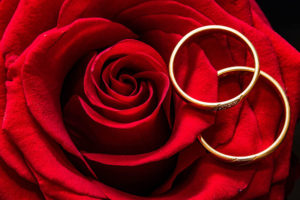When two people desire to form a lasting, lifelong partnership with each other in God’s love, they turn to marriage. Marriage is a union, an unfolding process of intentional living and growing together. In a marriage, each person as an individual and both as a couple gradually transform and mature in God’s presence and image.
Christian marriage is a sacrament— an outward and visible sign of God’s grace bringing two persons together and nurturing their love.
Marriage is a vocation, a calling to a particular vowed manner of life over the course of a lifetime. Not all people are called to marriage, but for those who are, it is to be entered into with mutual care, respect, and delight.
All this is why a wedding in The Episcopal Church is a sacred ritual that acknowledges and celebrates, before God and the community, the desire of the couple to enter a lifelong covenant. It symbolizes the ending of former and other potential ways of life, establishing a particular pathway into the future—in which two people promise to travel together. By uniting within the context of a faith community, the couple recognize that God is active in the love they feel for one another, and they place their relationship in God’s care. The couple make their vows before God and the gathered community of family, friends and the Church. They in turn receive the grace and blessing of God to help them fulfill those vows.
 A wedding in The Episcopal Church is shaped by The Book of Common Prayer, Canon law, thoughtful and beautiful liturgical worship, and the laws of the state in which the marriage occurs. The Episcopal clergy person officiating at a wedding is responsible to provide pre-marital counseling and assists the couple in shaping a marriage service that reflects the tradition of the Episcopal church and the uniqueness of the persons who are committing to marriage.
A wedding in The Episcopal Church is shaped by The Book of Common Prayer, Canon law, thoughtful and beautiful liturgical worship, and the laws of the state in which the marriage occurs. The Episcopal clergy person officiating at a wedding is responsible to provide pre-marital counseling and assists the couple in shaping a marriage service that reflects the tradition of the Episcopal church and the uniqueness of the persons who are committing to marriage.
 The Episcopal Church has approved supplementary liturgical resources for more modern weddings and relationship blessings, including same-sex weddings, in the form of the resource I Will Bless and You Will Be a Blessing: Revised and Expanded 2015; at that link, scroll down to find two free pdfs to download or read.
The Episcopal Church has approved supplementary liturgical resources for more modern weddings and relationship blessings, including same-sex weddings, in the form of the resource I Will Bless and You Will Be a Blessing: Revised and Expanded 2015; at that link, scroll down to find two free pdfs to download or read.
The Episcopal Church requires that:
- At least one member of the couple be a baptized Christian.
- The ceremony be attested to by at least two witnesses.
- The marriage conform to the guidance of the Canons of The Episcopal Church and to the laws of the state.
- A couple in which one or both persons have previously been married and divorced must receive the consent of the bishop (this is facilitated by the officiating Episcopal clergy person)
Dioceses and individual congregations may have their own additional requirements for couples seeking to be married there.
The member of the clergy who solemnizes a marriage typically meets with the couple on several occasions prior to the service to discuss the meaning of Christian marriage in the couple’s life together.
[Adapted with permission from Emmanuel Episcopal Church, Baltimore, MD]Marriage in the Episcopal church in north texas
Find one of our congregations and connect with a priest there.
Episcopal Churches – North Region of the Episcopal Diocese of Texas
Bishop Mayer on marriage
The Rt. Rev. J. Scott Mayer, bishop of the Episcopal Church in North Texas, writes about marriage:
Marriage is a sacrament, and as such The Episcopal Church takes it seriously. Historically, Christian marriage is a solemn and public covenant between a man and a woman in the presence of God.
In the summer of 2015, Episcopalians witnessed two momentous decisions about marriage. The first was the Supreme Court ruling on same-sex marriage which affects our civil rights. Then the 78th meeting of the General Convention of The Episcopal Church acted to extend the sacrament of marriage to same-sex couples. This decision was the culmination of forty years of discernment in The Episcopal Church.
The marriage resolutions approved by the General Convention are inclusive of the historic diversity which characterizes our tradition. They give access to marriage liturgies to all couples while protecting the consciences of clergy and bishops who dissent theologically. It has always been true that no priest can be forced to perform any marriage. That remains the case.
I have given permission for the clergy of the [Episcopal Church in North Texas] to perform marriage liturgies for same-sex couples. I also have asked them to extend pastoral care and warm hospitality to couples from other dioceses whose bishop disagrees with the decision of General Convention. This hospitality extends to priests of the congregations those couples attend, to the degree their bishop allows.
Marriage is marriage, whether between a man and a woman or between a same-sex couple. It remains a solemn and public covenant between two people in the presence of God. The expectations and requirements are the same for all couples in weddings officiated by the clergy of this diocese.
We are aware of the rich diversity of opinions held on this topic. But always, we are sisters and brothers bound together in the love of Jesus Christ. God loves us all. No exceptions.